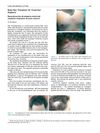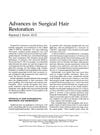 21 citations,
February 2017 in “International Journal of Women's Dermatology”
21 citations,
February 2017 in “International Journal of Women's Dermatology” Hormonal therapies help treat female hair loss, but results are slow and vary.
 21 citations,
September 1979 in “Archives of Otolaryngology-head & Neck Surgery”
21 citations,
September 1979 in “Archives of Otolaryngology-head & Neck Surgery” The Juri flap procedure is effective for hair transplantation but requires careful patient selection and skilled surgeons.
 20 citations,
August 2009 in “Journal of The European Academy of Dermatology and Venereology”
20 citations,
August 2009 in “Journal of The European Academy of Dermatology and Venereology” Occipital scalp affects female hair loss; terminal/vellus ratio helps diagnose androgenetic alopecia.
 14 citations,
January 2006 in “Australasian journal of dermatology”
14 citations,
January 2006 in “Australasian journal of dermatology” Alopecia areata can look like frontal fibrosing alopecia, making diagnosis hard.
 13 citations,
October 1993 in “International Journal of Dermatology”
13 citations,
October 1993 in “International Journal of Dermatology” Minoxidil effectively promotes hair regrowth in younger patients with small balding areas.
 12 citations,
January 2017 in “Skin appendage disorders”
12 citations,
January 2017 in “Skin appendage disorders” Two patients with skin lupus were mistakenly thought to have a different scalp condition but improved with lupus treatment.
 12 citations,
October 2016 in “Anais Brasileiros de Dermatologia”
12 citations,
October 2016 in “Anais Brasileiros de Dermatologia” Frontal Fibrosing Alopecia may be linked to autoimmune diseases like Sjögren's syndrome.
 12 citations,
July 2016 in “Atlas of the Oral and Maxillofacial Surgery Clinics”
12 citations,
July 2016 in “Atlas of the Oral and Maxillofacial Surgery Clinics” The document concludes that the endoscopic brow lift is a less invasive cosmetic surgery that requires careful technique and patient selection to achieve lasting, aesthetically pleasing results.
 12 citations,
July 2008 in “Facial Plastic Surgery Clinics of North America”
12 citations,
July 2008 in “Facial Plastic Surgery Clinics of North America” The document concludes that careful planning and consideration of male brow anatomy are essential for successful facial rejuvenation with cosmetic surgery.
 10 citations,
March 2016 in “Journal of The American Academy of Dermatology”
10 citations,
March 2016 in “Journal of The American Academy of Dermatology” Finasteride's effectiveness for frontal fibrosing alopecia is uncertain.
 10 citations,
January 2013 in “International Journal of Trichology”
10 citations,
January 2013 in “International Journal of Trichology” More vellus hairs in frontal scalp indicate early female pattern hair loss.
 7 citations,
June 1992 in “The Journal of Dermatologic Surgery and Oncology”
7 citations,
June 1992 in “The Journal of Dermatologic Surgery and Oncology” Hair transplantation is a viable treatment for some types of female hair loss, with careful donor assessment and attention to psychological factors.
 6 citations,
April 2018 in “Facial Plastic Surgery”
6 citations,
April 2018 in “Facial Plastic Surgery” Treating the temple area carefully with combined methods improves facial youthfulness.
 6 citations,
August 2006 in “Journal of Cutaneous Pathology”
6 citations,
August 2006 in “Journal of Cutaneous Pathology” Two teenage brothers had a rare, treatment-resistant form of female-pattern hair loss with unusual scalp changes.
 5 citations,
January 2020 in “Journal of Dermatology”
5 citations,
January 2020 in “Journal of Dermatology” Temporal hair loss relates to overall scalp hair loss in women.
 5 citations,
March 2012 in “Actas Dermo-Sifiliográficas”
5 citations,
March 2012 in “Actas Dermo-Sifiliográficas” Body-hair transplant successfully improved scarred areas and frontal hair density without visible chest scarring.
 5 citations,
December 2004 in “Dermatology”
5 citations,
December 2004 in “Dermatology” Two women with very high androgen levels had only slight skin issues, one due to a non-classical adrenal disorder and the other due to an adrenal tumor.
 4 citations,
July 2016 in “Journal of cosmetic dermatology”
4 citations,
July 2016 in “Journal of cosmetic dermatology” Dermatologists should use hair relaxers carefully to avoid hair and scalp damage, following specific guidelines for application and maintenance.
 4 citations,
July 2001 in “Personality and Individual Differences”
4 citations,
July 2001 in “Personality and Individual Differences” Men with moderate hair loss had the best spatial thinking, and long-term DHT might affect cognition.
 3 citations,
November 2020 in “Clinical, Cosmetic and Investigational Dermatology”
3 citations,
November 2020 in “Clinical, Cosmetic and Investigational Dermatology” Early diagnosis and combination therapy, especially with finasteride and dutasteride, are key to managing Frontal Fibrosing Alopecia effectively.
 3 citations,
November 2017 in “The American Journal of Cosmetic Surgery”
3 citations,
November 2017 in “The American Journal of Cosmetic Surgery” The new Cosmetic Surgery Scar Assessment Scale (CSSAS) was found to be simple and effective in evaluating scars from hair restoration surgeries.
 2 citations,
January 2017 in “Przegla̧d dermatologiczny”
2 citations,
January 2017 in “Przegla̧d dermatologiczny” Two trichoscopic patterns found in hair loss: diffuse fibrotic and androgenetic alopecia, affecting treatment choice and regrowth chances.
 2 citations,
June 2000 in “Journal of Oral and Maxillofacial Surgery”
2 citations,
June 2000 in “Journal of Oral and Maxillofacial Surgery” Hair transplantation techniques have improved over time, leading to natural-looking results and high graft survival rates, making it a popular treatment for hair loss.
 1 citations,
January 2019 in “Acta dermato-venereologica”
1 citations,
January 2019 in “Acta dermato-venereologica” The woman's skin and hair symptoms were confirmed as frontal fibrosing alopecia, and while facial papules are common in such cases, there's no effective local treatment, but systemic treatments can help.
 1 citations,
July 2018 in “Elsevier eBooks”
1 citations,
July 2018 in “Elsevier eBooks” FAPD and possibly CCCA may be AGA subtypes, and treatments combining antiandrogens, hair growth agents, hair transplants, and anti-inflammatories could be effective.
 1 citations,
April 2017 in “Journal of Investigative Dermatology”
1 citations,
April 2017 in “Journal of Investigative Dermatology” Using a teletriage system greatly increased access to skin care for uninsured Latino immigrants at a clinic.
 1 citations,
January 1998 in “Seminars in Plastic Surgery”
1 citations,
January 1998 in “Seminars in Plastic Surgery” Hair transplantation using micro- and minigraft megasessions is safe, effective, and provides natural results with high patient satisfaction.
 1 citations,
January 1993 in “Facial Plastic Surgery”
1 citations,
January 1993 in “Facial Plastic Surgery” Surgical hair restoration has improved since 1959, with new techniques like minigrafts, micrografts, and scalp reductions creating more natural hairlines and reducing bald skin, despite some risks and potential for scarring.
 September 2023 in “Ain Shams medical journal”
September 2023 in “Ain Shams medical journal” 31% of female high school students in Minia have hair loss from tight hairstyles, which can become permanent if not treated early.
 January 2021 in “Türkiye klinikleri dermatoloji dergisi”
January 2021 in “Türkiye klinikleri dermatoloji dergisi” Eyebrow loss in frontal fibrosing alopecia is common and may be linked to other health issues.






























